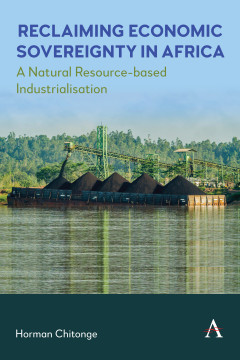Reclaiming Economic Sovereignty in Africa
A Natural Resource-based Industrialisation Perspective
By Horman Chitonge
Other Formats Available:
E-Book- About This Book
- Reviews
- Author Information
- Series
- Table of Contents
- Links
- Podcasts
About This Book
This book has approached the question of natural resources in Africa from a different perspective. It makes the argument that natural resources in Africa can be utilised to reclaim its economic sovereignty which is central to the economic development and industrialisation of the continent. In making this argument, the book acknowledges that African countries have political control (de jure sovereignty) over natural resources in their respective territories, but most of them have little control over what happens to these resources (de facto sovereignty) once an extractive licence is issued. This is evident in the fact that the bulk of primary commodities in Africa are shipped out of the continent in raw or semi-processed form, with most African states having no say over what happens to these natural resources once they are extracted. This is mainly because most countries have low productive capabilities to transform the abundant natural resources into final consumer and capital goods. As a consequence of low productive capabilities, most African countries have no option (no margin of discretion or autonomy) but to sell their primary commodities in raw or semi-processed form, leading to the now famous situation of ‘commodity trap’.
The lack of freedom (autonomy) to choose what happens to natural resources extracted from the continent is an indication of the weak economic sovereignty. Although the primary commodity companies that operate across the continent obtain licences and pay royalties and other taxes levied for extracting natural resources, African states have no say after primary commodities are extracted partly because the bulk of primary resources extracted leave the continent and get processed into final and intermediate goods elsewhere. As long as the processes of adding value to primary commodities take place outside of the continent, African countries have no control and role to play in the process of adding value. This is the main cause of weak economic sovereignty because the most powerful process (transforming natural resources into final and intermediate goods and services) occurs outside, beyond the continent’s reach. As the book illustrates, it is the capacity to transform primary resources into goods and services needed in society that strengthens a country’s economic sovereignty and ultimately strengthens its political sovereignty and influence.
Drawing from a natural resource-based industrialisation perspective, the book offers suggestions on how African countries can use their rich natural resources to strengthen their economic sovereignty, arguing that natural resources constitute the foundation for building sustainable and inclusive economies on the continent. The book argues that the key to strengthening economic sovereignty (which includes financial and monetary sovereignty) is building strong and diversified productive capabilities, because this enables a country to enlarge its economic options and alternatives, which in turn increases its economic sovereignty. Building of regional value chains (RVCs) capitalising on the African Continental Free Trade Agreement offers a new opportunity for the continent to strengthen its economic sovereignty by building diverse productive capabilities.
Reviews
“The primary focus of the manuscript revolves around the pivotal concept of economic sovereignty, emphasizing the need for increased agency in controlling resources and advocating for value chain upgrading within countries pursuing resource-based development. By illustrating various examples, the text convincingly argues that a well-planned and implemented resource-based development strategy can be a liberating project, fostering economic diversification and capturing value through in-country processing.” —Maha Ben Gadha, Senior Researcher and Regional Economic Program Manager at the Rosa Luxemburg Foundation, North Africa Office.
“Despite Africa being rich in natural resources, often the benefits do not inure to the general populace due to governance and value addition challenges. Thus, Africa has de jure sovereignty, but not resource authority. Chitonge redirects us to unpacking and reclaiming economic sovereignty through natural resource-based industrialisation.” —Pius Siakwah, University of Ghana, Legon, Accra, Ghana.
Author Information
Horman Chitonge is professor of African Studies at the Centre for African Studies, University of Cape Town (UCT). His work focuses on alternative strategies for economic transformation and development in Africa.
Series
Anthem Africology Series
Table of Contents
List of Figures, List of Tables, List of Acronyms, Acknowledgements, Preface, Chapter One - Economic Sovereignty and Natural Resources in Africa: An Introduction, Chapter Two - Sovereignty and Agency: A Natural Resource Perspective, Chapter Three - Economic Sovereignty in Africa, Chapter Four - Natural Resource Sovereignty in Africa: The Elusive Quest for Self-Determination, Chapter Five - Natural Resources and Economic Development in Africa: The Paradox of Plenty, Chapter Six - Natural Resource-Based Industrialisation: Making the Most of Africa’s Natural Wealth, Chapter Seven - Natural Resources and the Re-domestication Value Addition in Africa, Chapter Eight - Reclaiming Africa’s Economic Sovereignty: What Will it Take?, References, Index
Links
Stay Updated
Information
Latest Tweets



